
LBJ Killed JFK

Who was Lyndon Baines Johnson?
Most of us knew Lyndon Banes Johnson as "LBJ" -- the tall man with the Texas accent who reluctantly assumed the responsibilities as the 36th president of the United States following the assasination of John Kennedy. Some of us remember him addressing the nation, looking like a sad hound dog, regretting that more American soldiers had died in the Vietnam War -- a conflict that divided the nation between Democrats and Republicans, between the old and the young and between the rich and the poor.
Not many of us knew who Lyndon Johnson was before he was placed on the Kennedy presidential ticket in 1960. He was simply a senator from Texas. It was John Kennedy who took the spotlight, leaving LBJ in the shadows.
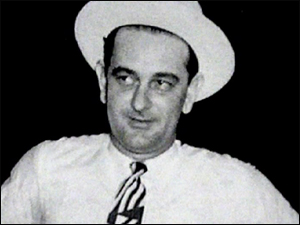 Johnson was born in 1908 in Johnson City, Texas. There's no need to bore anyone with the details of his youth. Some claim he was a bully and others describe his inflated ego and his ruthless ambition to succeed.
Johnson was born in 1908 in Johnson City, Texas. There's no need to bore anyone with the details of his youth. Some claim he was a bully and others describe his inflated ego and his ruthless ambition to succeed.
In 1941, a young Lyndon Johnson tried and failed to be elected as the Texas Democratic Senator. It was a loss that hit Johnson hard and an event he was determined would never be repeated. In 1948 he tried for the Senate seat again, this time up against a popular candidate named Stevenson. Throughout the campaign the polling showed a very close race. Towards the end of the race, it looked like Stevenson was ahead. But Johnson had a secret weapon -- the "Duke of Duval County," George Parr.
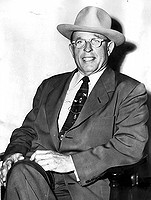 Parr [right] controlled the votes in southern Texas. Everyone watched the candidate he backed and his influence was the stuff of legends. Of course, there was a price for Parr's support. Sometimes it was paid up front but sometimes it was put off to the future.
Parr [right] controlled the votes in southern Texas. Everyone watched the candidate he backed and his influence was the stuff of legends. Of course, there was a price for Parr's support. Sometimes it was paid up front but sometimes it was put off to the future.
It was Johnson's hard luck that Parr had switched his vote in Johnson's first Senate bid and thus lost Johnson the election. Now, the same George Parr, sufficiently paid by Johnson's camp and with no offers from the Stevenson camp, delivered the election to Johnson.
Six days after the polls had closed, the winner was still not decided. By all estimates, Stevenson was expected to win. But then something miraculous happened. In the district of Alice, Texas, 202 additional votes suddenly appeared in the Precinct 13 voting box. All but 2 of these were cast for Lyndon Johnson.
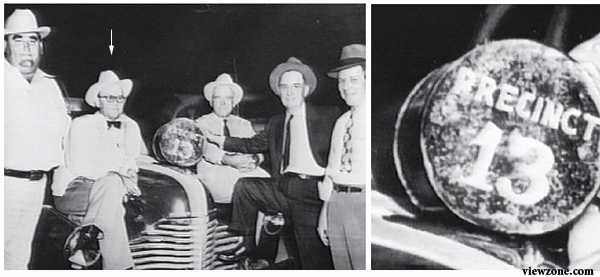
This photo was among the personal archives of Lyndon Johnson, collected after his death. Known as the "Box 13 Scandal," many believe it supports the stories that the election was rigged.
Suspicious officials noted that these 202 names appeared to be added to the list, were in alphabetical order, and were in the same handwriting and written with the same ink. Stevenson cried foul, but Johnson and his "friends" won the election with the support of the Democratic Convention.
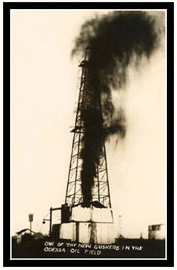 Senator Johnson used his office to grow his influence with big oil. His main appeal was his support for the Oil Depletion Allowance which allowed oil companies to avoid taxes on their wealth.
Senator Johnson used his office to grow his influence with big oil. His main appeal was his support for the Oil Depletion Allowance which allowed oil companies to avoid taxes on their wealth.
As Robert Bryce pointed out in his book, Cronies: Oil, the Bushes, and the Rise of Texas, America's Superstate,
"Numerous studies showed that the oilmen were getting a tax break that was unprecedented in American business. While other businessmen had to pay taxes on their income regardless of what they sold, the oilmen got special treatment."
Bryce gives an example in his book how the oil depreciation allowance works.
"An oilman drills a well that costs $100,000. He finds a reservoir containing $10,000,000 worth of oil. The well produces $1 million worth of oil per year for ten years. In the very first year, thanks to the depletion allowance, the oilman could deduct 27.5 per cent, or $275,000, of that $1 million in income from his taxable income. Thus, in just one year, he's deducted nearly three times his initial investment. But the depletion allowance continues to pay off. For each of the next nine years, he gets to continue taking the $275,000 depletion deduction. By the end of the tenth year, the oilman has deducted $2.75 million from his taxable income, even though his initial investment was only $100,000."
Such a system was clearly unfair and only benefited a small group of businessmen in Texas. It seemed only a matter of time before Congress removed this tax loophole. However, these oilmen used some of their great wealth to manipulate the politicians in Washington -- especially LBJ.
Ironically, Kennedy wanted to reduce the Oil Depletion Allowance. Kennedy was also opposed to the escalating Vietnam conflict. With 16,000 military advisors in Vietnam, big oil and big business desperately wanted to see this develop to a full blown war. But Kennedy had already signed a National Security Document (NSA #263) to withdraw all of the troops by 1965. With billions to be made from a military economy, Kennedy was an obvious obsticle. But Johnson was seen as a friend to big money.
This love-hate conflict with the Kennedy administration was especially felt by one wealthy, big-oil man named Clint Murchison. And it was at the Murchison mansion, just before Kennedy's trip to Dallas in 1963, where the fate of both LBJ and JFK would eventually be decided.
So why was LBJ on the JFK ticket?
With their politics often in opposition, it seems odd that Kennedy chose Johnson to be his running mate in 1960. In fact, John Kennedy and his brother Robert didn't want any part of Johnson. But there was a problem.
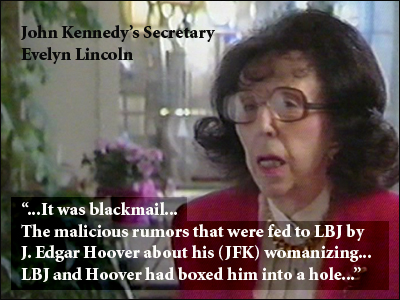
John Kennedy had his personal demons. He was addicted to IV "meth" (methamphetamine) and steroids because of his severe back pain and chronic Addison's disease. He was also a womanizer. He had many affairs while a Senator and these were well documented by J. Edgar Hoover. Hoover, who had his own sexual demons (he was a closet homosexual), was himself blackmailed by organized crime and big oil interests into threatening the Kennedys with exposure of JFK's sexual activities unless he allowed Johnson a place on his ticket. Hoover played his card and the Kennedys reluctantly folded.
According to Kennedy's personal secretary, Evelyn Lincoln, both Bobby and John Kennedy were extremely upset about the decision.
In the room at the Biltmore Hotel... they were huddled together closely, on the bed, discussing about LBJ... Bobby would get up, look out the window and stare. John would sit there and think. It was an intense 30 minutes... How to maneuver to get it so he (Johnson) wouldn't be on the ticket..."It was blackmail... the malicious rumors were fed to LBJ by J. Edgar Hoover about his (Kennedy's) womanizing... LBJ and Hoover had boxed him into a hole."
It was a short lived victory for LBJ. Johnson has been on the top of the heep as a Texas senator. But as Vice-President, he was demoted to cutting ribbons and performing ceremonial tasks around the globe. His huge ego was limited to handing out pens with his autograph printed on them but his autthority was severely limited. Once, while traveling to Scandinavia, the US embassy sent an uncoded telegram, for all eyes to read, warning that anything Johnson said should not be taken as representing the views of the American government. This kind of humiliation accelerated the hostility of Johnson for the Kennedys and drove him to take action.
But Johnson couldn't get rid of Kennedy as easily as he had made his Texan opponants disappear. JFK was, after all, the President of the United States. This job would require more than his trigger-man, Wallace. It would require a person who could coordinate the intelligence community, the FBI and organized crime. Fortunately for Lyndon Johnson, such a person existed.

